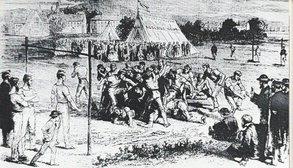
2. 1869 - 1900
The club’s early games were played at Winckley Meadow, before, in 1871 a move to West Cliff was made. This was the home of the town’s Cricket Club (who ‘Hoppers paid an annual rent of £4 for use of a pitch) as it remains today. A number of other clubs where in existence in the town including Preston Olympic, Preston Atheneum, Fishwick Ramblers, and Preston Rovers. A team called North End, who became the now famous Preston North End, played rugby and cricket during this era.
Four figure crowds often witnessed home fixtures, especially against Manchester and Liverpool. The admission price was 6d at the West Cliff end and 3d to watch from the South Meadow Lane end, Ladies free! There was even a newspaper advert for special trains to transport spectators to the ‘Hoppers away match versus Manchester in 1878. A Grasshopper’s match at West Cliff in March 1878 against ’20 of the Town’ drew 3000 spectators. Such was the popularity of the game.
Around this time the club could boast four internationals in Albert Neilson Hornby JP CC (9 caps) and the brothers William Henry Hunt (4 caps), James Thomas Hunt (3 caps) and Robert Hunt (4 caps). Such strength lead a sporting journal of the time to suggest that ‘The Preston Football Club has undoubtedly won the premier position this season in Lancashire.’ Whilst gathering ‘caps’ under the ‘Hoppers name (apart from Robert Hunt) they all they had strong links with the Manchester Club, who, starting with the game in Dublin of 1878, were credited against the players name. A strong allegiance with Manchester was a necessity at the time, as they and Liverpool selected the County teams. The best then graduated to represent the North of England in ‘North v South’ matches, which were in fact the trials for the England team. In later years they, along with ‘Hoppers other better players played for and toured with The Manchester Club, only participating in major games with Grasshoppers’.
A.N. “Monkey” Hornby, “the Boss”, who came to ‘Hoppers from the Brookhouse Club of Blackburn (a team formed from the Hornby family’s group of mills in Blackburn) in 1870, still captaining his former club against Preston, the following season! He was equally as capable as an all rounder playing cricket as on the rugby field, once scoring an amazing ten runs off a single ball against Surrey at The Oval. Hornby was one of only two people to captain England in both sports, the other being A. E. Stoddard. During 1882 he captained both the England rugby and cricket teams, versus Scotland inManchester with the elliptical ball and Australia at the Oval with the smaller harder one! (the game at the Oval being the one that gave rise to ‘The Ashes’). He then became County President for the rugby game from 1884 – 1914 and Lancashire County Cricket from 1894 – 1916. He was still captaining the cricketing side of the county into his fifties, whilst acting as President and Chairman. On top of all this he was on the Committee of the R.F.U. in the mid. 1880’s, was associated with the M.C.C. from 1873 – 1898 and refereed major rugby matches after he retired from playing. It was reckoned he would have been equally as successful at the Association game had he not preferred rugby as he played a number of games for Blackburn Rovers in particular, their opening game and victory at Alexander Meadows over the famous Glasgow (Partick) on the second of January 1878 when he played ‘half back’. He was born on the 10th February 1847, in Blackburn, schooled at Harrow and died at his home in Nantwich on the 17th December 1925. This was after complications from an operation for internal trouble resulting, it is believed, from his horse falling and rolling over him on his way home from hunting a year or two previously. It is said that riding ‘The Hunt’ was his most favoured sport. He even sacrificed a tenth rugby cap for England against Scotland because it interfered with this particular love.
W.H. Hunt represented the club at a meeting to form a County Committee in 1881. Sidney A. Hermon (the club captain in 1870/1) whilst playing for Lancashire v Yorkshire at Whalley Range, Manchester, at the end of that season, became the first ‘Hopper to represent his County. The same Mr Hermon proposed in a committee meeting later that year to have the name ‘Grasshoppers Club’ dropped, and the club be called Preston Football Club. The motion was withdrawn.
The Association game swept through the area like a plague during the early 1880’s and soon the numerous rugby players were converted to soccer with ‘Hoppers leading lights playing for Manchester permanently. Consequently, what had been an area with around fifty rugby clubs was decimated, and part way through season 1885/6 reports and results of the once leading club in the area vanished from the printed press. The ‘Football Field & Sports Telegraph’, an early version of the ‘Bolton Buff’ Saturday evening newspaper, recorded a special meeting of Preston Grasshoppers was held on Wednesday 25th November 1885 when it was decided to cancel the remaining fixtures for the season. A brave statement, informing the public that ‘there were no intentions of dissolving the organisation’, was issued but this was only a forlorn hope. An article in the ‘Pastime’ weekly sporting newspaper of December 2nd 1885 stated:
” The Manchester and Preston Grasshoppers fixture at Whalley Range fell through owing to the collapse of the Preston Club, an event which was foreshadowed by the wretched results of their matches this season.“
The previous week’s edition recorded:
“The Free Wanderers beat Preston, at Preston, by the ridiculous score of eight goals & four tries to nil”
This was the end until 1900.

